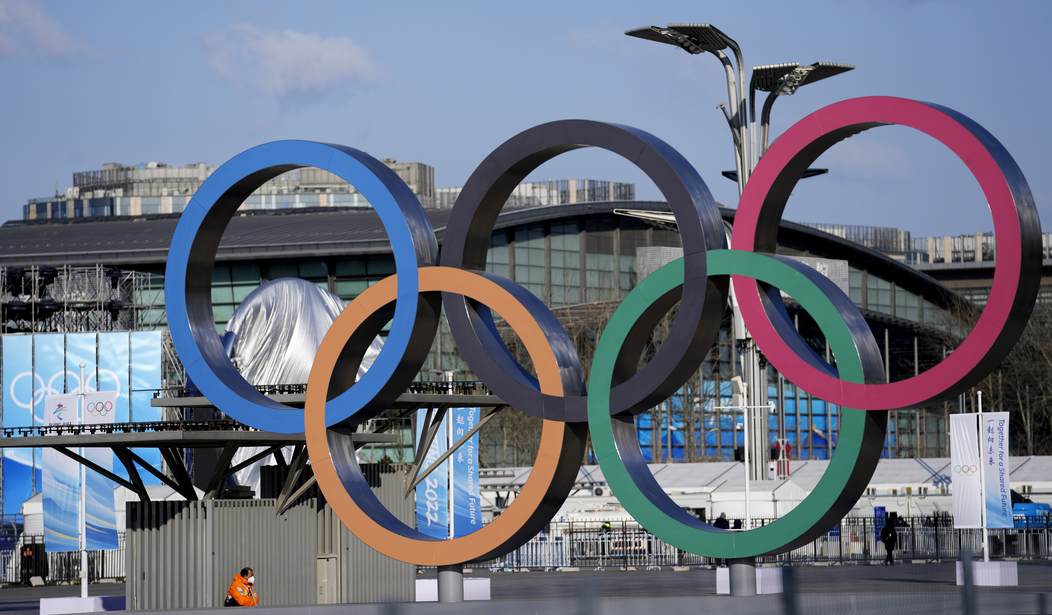Couldn’t happen to a nicer bunch of collaborators. After tossing billions at the IOC and planting their collective lips firmly on Xi Jinping’s posterior, NBC’s ratings for the Beijing Olympics turned out to be the worst in history. By their own figures, including streaming platforms, the audience fell 43% from the Pyeongchang opening ceremonies:
Friday‘s Winter Olympics opening ceremony drew nearly 14 million viewers on television, making it one of the least-viewed opening ceremonies on TV in Olympic history, according to numbers provided by NBC Sports.
Why it matters: This year’s Games, like the summer Games in Tokyo last year, are being impacted by a lack of fans and loved ones in stadiums that normally contribute to the excitement of watching the games live.
Details: Including viewership across digital platforms — like NBC’s streaming service Peacock and the NBC sports app — NBC Sports says the event drew 16 million viewers total.
That’s down about 43% from the 23.8 million people who watched the opening ceremony for the last winter Games in Pyeongchang in 2018.
It didn’t improve the next day when the competition started in earnest, either:
The first weekend of the 2022 Winter Olympics in Beijing has come and gone, and the ratings for the first Olympic Saturday quickly followed.
According to Yahoo Sports’ Dan Wetzel, NBC said it had a total audience of 13.6 million for the first Saturday of the Winter Olympics that includes NBC’s affiliated streaming services.
That’s far from the number NBC was looking for. The 2018 Winter Olympics in PyeongChang did 24.2 million on the same day. That’s a drop of 43.8-percent in a single cycle.
Be sure to read all the way through that last link, if for no other reason than The Spun’s willful blindness on the proximate cause of the collapse. The reasons proffered for the ratings disaster are: too many commercials, a lack of promotion, no compelling “characters,” and the short period between the delayed Tokyo summer games and this Olympiad (six months). Not once does The Spun mention the pushback on China’s genocide of the Uighurs or its demolition of freedom in Hong Kong, not to mention the whole COVID-19 pandemic that managed to kill millions of people around the world.
“Why do you think the Olympic ratings are so much lower this time than last?” asks The Spun at the end. Come on, man.
Actually, Axios manages to avoid those answers, too. Blindness appears to be contagious in this case.
Yahoo Sports’ Dan Wetzel had a more honest take on NBC’s “cataclysmic” ratings bomb:
Numerous countries, including the United States, are staging a “diplomatic boycott” of these Games due to what they say is China’s active campaign of genocide against the Uyghurs, a minority ethic group of mostly Muslims in the far northwest part of the country.
China denies the charge but has also banned United Nations human rights officials from entering the region.
In issues more directly related to the Games, China’s drastic anti-COVID measures have made life inside its “closed loop” a high-stress and near joyless experience for the athletes and a massive challenge for NBC.
Unlike NBC’s Savannah Guthrie, who described the use of a Uighur skier in the Olympic torch-lighting ceremony as an “in your face” moment to Western critics, Wetzel considers it more stomach-churning:
It ended with China using cross country skier Dinigeer Yilamujiang, who the state run media said has Uyghur heritage, as one of the cauldron lighters. It was a clear counter to the claims of genocide — see, look at this smiling, celebrated Uyghur.
It was a disturbing and dispiriting moment, a young athlete and an iconic moment in every Olympics used as a propaganda prop to cover up a campaign of slavery, torture, forced abortions and internment in reeducation camps. It did nothing to build good feelings toward the competition.
That might explain why the start of competition the next day did nothing to improve the ratings for NBC. Wetzel points out, correctly, that ratings for Olympiads usually build over the fortnight-plus of competition, so lower ratings are somewhat normal. However, these comparisons are being made in relation to the same schedule as in previous games, which means that the ratings hole is both real and spectacular. Plus, the nature of the regime in Beijing gives NBC practically no way to goose interest:
NBC is doing almost all it can but its reporters and crews are stuck in the “closed loop.” That eliminates live shots with mountains or historic buildings as backdrops as well as stories about the culture, architecture and people of China that can make the Olympics about more than just sport.
Host Mike Tirico broadcast from a set designed like a mountain chalet, but that could have been in Breckenridge, not Beijing. And Tirico, the face of the broadcast, will be leaving in the coming days to anchor NBC’s coverage of the Super Bowl, which due to the lengthening of the NFL season has spilled into the Olympic calendar and further siphoned off interest and outside media coverage.
Meanwhile, most of NBC’s play-by-play broadcasters are calling the Games remotely from studios in Connecticut rather than risk China’s COVID policies.
While that may be mostly indistinguishable to the viewer, it means the network can’t have the “Today Show” and its “Nightly News” broadcast live from the city for additional promotion. There are no segments with Tara Lipinski and Johnny Weir, say, shopping in Beijing. Or Al Roker trying to luge. Or whatever.
When one signs up for propaganda efforts with genocidal control freaks, that’s what they get. And frankly, that’s what they deserve.
Addendum: Jeff Dunetz and Wes Walker also see just desserts getting served up by American viewers. Be sure to read it all.







Join the conversation as a VIP Member